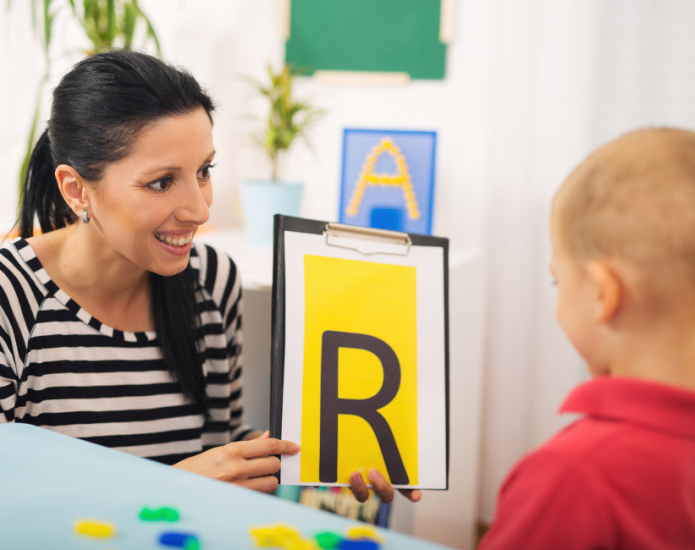Stuttering is a normal part of speech development. As children learn to speak, they may come across words or sounds that they don’t know well yet, which can cause them to repeat or prolong them. For parents, this stuttering can be concerning or frustrating but it is important to understand that this could be a normal part of a child’s development. In some cases, stuttering will resolve on its own, but for some children it may persist unless they receive support.
It’s important to know that stuttering doesn’t affect a child’s development, but they may become self-conscious or embarrassed if they are aware they are doing it. If your child is showing signs of stuttering, it’s important to be patient and support them to build the skills and confidence to communicate.
What is Stuttering?
Stuttering, also known as stammering, is a motor speech disorder characterised by various interruptions to the smooth flow of speech.
Stuttering usually starts when children are between two and five years of age, around the time they start learning to combine words and form sentences. It may start suddenly or it may develop gradually over days or weeks. It is common for stuttering to fluctuate from day-to-day or from one conversation to the next for no obvious reason.
Parents often report that their children stutter more when they are tired or very excited, or have a long story to tell. Children can have long periods where the stuttering seems to disappear, only to return days, weeks or months later.
Signs of Stuttering in Children
Your child may have developed a stutter if they display any of the following signs for more than six months:
- Repeating sounds, words, and phrases often and regularly
- Difficulty starting a word or phrase
- Displaying signs of struggle or effort when speaking
- Facial or body movements when trying to talk such as rapid blinking, clenched fists, lip tremors or head jerks
- Vocal tension that causes rising pitch or loudness
- Anxiety related to speaking, i.e. avoiding situations that require talking
- Changing words used for fear of stuttering
Types of Stutters
There are three main types of stuttering. Children who stutter might have one or more of these types:
- Repetitions – when a sound, syllable or word is repeated over and over. For example:
- ‘Give me the b-b-b-b-b-ball.’
- ‘Give me the bas-bas-bas-basketball.’
- ‘Give give give give give me the ball.’
- Prolongations – stretching of words or sounds. For example, ‘Give mmmmmme the ball’.
- Blocks – a pause in a child’s speech where no sound comes out. Sometimes children may seem unable to make a sound, even though they are attempting to force words out.
Children may also develop non-verbal movements associated with their stutter. For example, they might blink their eyes, jerk their head, make faces, or clench their fists.
How is Stuttering Diagnosed?
If your child’s stuttering continues for more than six months, it is important to book an appointment with a speech pathologist for a formal assessment. The speech pathologist will assess your child’s stuttering to determine if they need support straight away, or whether to wait and monitor your child’s progress.
To diagnose stuttering in children, a speech pathologist will:
- Ask you about your family history, since stuttering is usually genetic.
- Ask questions about your child’s speech and their stuttering symptoms.
- Test your child’s ability to speak with different techniques and in various situations.
Not all children who start to stutter will continue. Some children who stutter will recover naturally, although the average time taken to recover is not known. Other children will continue to stutter and require therapy. It is not possible to predict which children will need therapy and those who will recover naturally.
Support for Stuttering in Children
The type of support for stuttering will depend on your child’s age and the severity of their stutter. However, research shows that stuttering intervention is most effective in children under the age of six.
In Australia, the most widely used treatment for stuttering in children is the Lidcombe Program. This program is a behaviourally-based intervention conducted jointly by speech pathologists and parents. Parents attend weekly speech therapy sessions with their child where they are taught to measure their child’s stuttering, give effective feedback and practice daily support techniques with them at home.
The aim of stuttering treatment is to help your child to speak fluently and confidently.
Causes of Stuttering
Though the cause of stuttering is not yet fully understood, we do know the following facts:
- The cause of stuttering is physiological. It is not caused by psychological factors like anxiety, stress, nerves, excitement or tiredness. However, these factors may contribute to a stutter becoming more frequent or prominent.
- A stutter is not learned from others and cannot be copied or ‘caught’ from siblings, parents or others.
It is thought that stuttering may be genetic given that children with relatives who stutter are more likely to develop a stutter themselves. However, this does not mean that a child who has a family history of stuttering will definitely stutter.
How Can Parents Support Children Who Stutter?
The most important thing that a child who stutters needs is support, encouragement and acceptance by their parents, carers and other important adults in their life. Give your child the patience and time they need to build confidence and self-esteem, despite the difficulties they are experiencing. To help your child build confidence in their speech:
Things to do
- Use family meals as a time to talk with your child. Avoid distractions such as music or TV.
- Let your child speak for themselves and to finish thoughts and sentences.
- Listen to what your child is saying, not how it is being said.
- Repeat to your child what they have said to you, to show you have understood them.
- Speak slowly and clearly when talking to your child. Modelling a slow rate of speech will help with your child’s fluency.
- Maintain eye contact with your child. Try not to show signs of being upset or frustrated.
- Provide a calm atmosphere in the home. Try to slow down the pace of family life.
- Reassure your child if they are aware of their stutter and are concerned.
Things not to do
- Expect your child to always speak correctly. Allow talking to be fun and enjoyable.
- Interrupt your child in an attempt to fix or treat their stutter. Comments such as “slow down” or “take your time”, however well-intentioned, will only make your child feel more self-conscious.
- Make your child speak or read aloud when they do not want to.
- Try and find other ways to communicate or other activities to do that don’t involve talking.
If your child is a little older, they may be more aware of the problem and may be embarrassed by it. Friends may draw attention to it, or they may get teased. If this happens, it is a good idea to talk to your child’s teacher who can give them support at school, be more aware of not putting them in stressful speaking situations and help address issues with their peers.
Helpful Resources
How Learning Links Can Help
Learning Links has a range of programs and resources to empower children to build vital speech and language skills.



